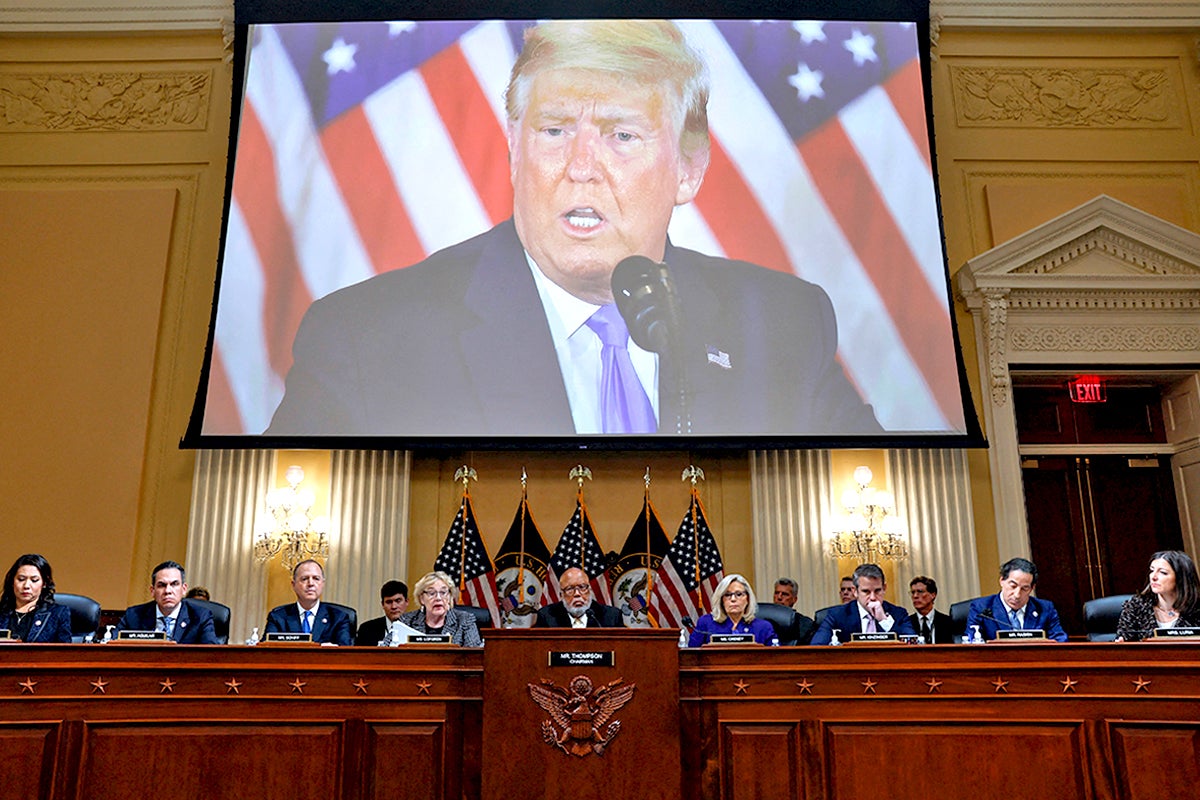
After 18 months of investigations, hundreds of witness interviews, and nine blockbuster public hearings, the House January 6 select committee has issued the first summary of what promises to be an eight-chapter report on former president Donald Trump’s attempt to overturn results of the 2020 election and the riotous attack on the Capitol that ensued as a result.
On Monday, the panel voted unanimously to approve the full report that will be released on Wednesday, along with the majority of evidence it has collected since it began its’ probe in July 2021.
The 160-page “executive summary” released by the panel after its final meeting largely reiterates much of what the committee has presented in its public sessions, including evidence showing that Mr Trump showed no desire to intervene as his supporters attacked police officers and ransacked the Capitol while disrupting the quadrennial joint session of Congress marking the peaceful transfer of power following presidential elections going back to the founding of the American republic.
It also indicated that the committee believes the Department of Justice can use its own authority to further develop evidence that will show Mr Trump committed numerous federal crimes, including violating US law against inciting an insurrection.
While the full eight volumes will recount an unabridged version of the panel’s findings, here are some top takeaways from the executive summary:
Trump’s campaign manager was so ‘wary’ of Giuliani that he ordered his office locked
The summary recounts an anecdote which revealed that ex-New York City Mayor Rudolph Giuliani’s team made Trump campaign manager Bill Stepien so uneasy that he told his assistant to lock his office door when they entered.
“And, sure enough, Mayor Giuliani tried to get in my office and ordered her to unlock the door, and she didn’t do that," he said in the excerpt from his deposition included in the summary.
The committee says Trump’s ex-White House counsel could be more forthcoming if compelled by a grand jury
The committee report recalls that Trump White House Counsel Pat Cipollone frequently refused to discuss conversations with Mr Trump because he said they were shielded executive privilege.
“During the ensuing riot, the president refused to condemn the violence or encourage the crowd to disperse despite repeated pleas from his staff and family that he do so," the report said. "The committee has evidence from multiple sources establishing these facts, including testimony from former White House Counsel Pat Cipollone.”
The panel added that Mr Cipollone “can provide direct testimony establishing that President Trump refused repeatedly, for multiple hours, to make a public statement directing his violent and lawless supporters to leave the Capitol” if forced to by a recent ruling ordering him to testify before the grand jury currently investigating Mr Trump’s attempts to overturn the election.
Members believe Ivanka Trump and other ex-White House aides were not ‘forthcoming’ in their testimony
While Mr Cipollone, formerly Mr Trump’s top White House lawyer, answered questions except when limited by privilege, the panel found Mr Trump’s daughter turned unpaid adviser Ivanka Trump showed “a lack of full recollection of certain issues” when pressed during her sworn deposition before the select committee.
Another former Trump White House official who members believe to have exhibited a lack of candor was ex-White House Press Secretary Kayleigh McEnany.
Now a Fox News personality, Ms McEnany is reported to have “seemed evasive, as if she was testifying from pre-prepared talking points” during her interview with the panel.
The report added that her testimony “did not seem nearly as forthright as that of her press office staff, who testified about what McEnany said”.
Trump wanted to personally lead efforts to overturn the election from the Capitol
The report reveals that committee members believe Mr Trump’s desire to follow his supporters to the Capitol arose from his need to lead them personally.
"The committee’s principal concern was that the president actually intended to participate personally in the January 6th efforts at the Capitol, leading the attempt to overturn the election either from inside the House chamber, from a stage outside the Capitol, or otherwise," the members wrote.
“The committee regarded those facts as important because they are relevant to President Trump’s intent on January 6th ... there is no question from all the evidence assembled that President Trump did have that intent”.
A White House official who the panel granted anonymity because of the person’s “sensitive national security responsibilities” testified that they were “very concerned” about Mr Trump’s intentions on the day of the attack.
“We all knew what that implicated and what that meant, that this was no longer a rally, that this was going to move to something else if he physically walked to the Capitol,” the official said.
Mr Trump did have a ‘furious interaction’ with his lead Secret Service agent
The committee revealed that “the vast majority of witnesses” — including “multiple members of the Secret Service, a member of the Metropolitan Police, and national security officials in the White House” — testified that Mr Trump’s behaviour after leaving the stage at the January 6 rally he spoke at was “'irate,' 'furious,' 'insistent,' 'profane' and 'heated’”.
The report said Mr Trump “forcefully expressed his intention that Bobby Engel, the head of his Secret Service detail, direct the motorcade to the Capitol,” and specified that “several sources” described a “furious interaction” between Mr Trump and Robert Engel, the head of his Secret Service detail, similar to testimony from ex-White House aide Cassidy Hutchinson, who told the committee she was told that Mr Trump grabbed Mr Engel and demanded to be taken to the Capitol.







